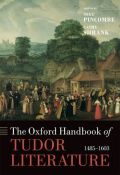
This volume is the first major collection of essays to look at the literature of the entire Tudor period, from 1485-1603. Its forty-five chapters have been written by internationally-acknowledged experts in the field; they give insight into the energy and brilliance of sixteenth-century literature. This is the first major collection of essays to look at the literature of the entire Tudor period, from the reign of Henry VII to the death of Elizabeth I. It pays particular attention to the years before 1580. Those decades saw, amongst other things, the establishment of print culture and growth of a reading public; thevarious phases of the English Reformation and process of political centralization that enabled and accompanied them; the increasing emulation of Continental andclassical literatures under the influence of humanism; the self-conscious emergence of English as a literary language and determined creation of a native literary canon; the beginnings of English empire and the consolidation of a sense of nationhood. However, study of Tudor literature prior to 1580 isnot only of worth as a context, or foundation, for an Elizabethan 'golden age'. As this much-needed volume will show, it is also of artistic, intellectual,and cultural merit in its own right. Written by experts from Europe, North America, and the United Kingdom, the forty-five chapters in The Oxford Handbook of Tudor Literature recover some of the distinctive voices of sixteenth-century writing, its energy, variety, and inventiveness. As well as essays on well-known writers, such asPhilip Sidney or Thomas Wyatt, the volume contains the first extensive treatment in print of some of the Tudor era's most original voices. INDICE: Acknowledgements Conventions and list of abbreviations List of illustrations Notes on contributors Prologue: The travails of Tudor Literature Section I: 1485-1529 Caxton and the invention of printing Dramatic theory and Lucres' 'discretion': the plays of Henry Medwall Stephen Hawes and courtly education Having the last word: manuscript, print, and the envoy in the poetry of John Skelton All for love: Lord Berners and the enduring, evolving romance Section II: 1530-1559 Thomas More, William Tyndale, and the printing of religious propaganda Rhetoric, conscience and the playful positions of Sir Thomas More John Bale and controversy: readers and audiences Sir Thomas Elyot and the bondsof community John Heywood and court drama Thomas Wyatt and Francis Bryan: plainness and dissimulation Piety and poetry: English psalms from Miles Coverdaleto Mary Sidney Katherine Parr and her circle John Leland and his heirs: the topography of England Biblical allusion and argument in Luke Shepherd's verse satires Reforming the reformers: Robert Crowley and Nicholas Udall William Baldwin and the Tudor imagination Directions for English: Thomas Wilson's Art of Rhetoric, George Puttenham's Art of English Poesy, and the Search for Vernacular Eloquence Order and Disorder: John Proctor's History of Wyatt's Rebellion (1554) Marian political allegory: John Heywood's The Spider and the Fly Hall's chronicle and A Mirror for Magistrates: history and the tragic pattern A place in the shade: George Cavendish and de casibus tragedy What is my nation?: language, verse and politics in Tudor translations of Virgil's Aeneid Thomas Hoby,William Thomas and mid-Tudor travel to Italy Popularizing courtly poetry: Tottel's 'Miscellany' and its progeny Section III: 1560-1579 Minerva's men: horizontal nationhood and the literary production of Googe, Turberville, and Gascoigne 'For This is True or Els I do Lye': Thomas Smith, William Bullein and Mid-Tudor Dialogue English Seneca: Heywood to Hamlet Political tragedy in the 1560s: Cambises and Gorboduc John Foxe's Acts and Monuments, 1563-1583: antiquity and the affect of history Tragical histories, tragical tales Foresters, ploughmen and shepherds: versions of Tudor pastoral Interludes, economics and the Elizabethan stage Ovidian reflections in Gascoigne's Steel Glass The art of war:martial poetics from Henry Howard to Philip Sidney Thomas Whythorne and first-person life-writing in the sixteenth century Pageants and Propaganda: Robert Langham's Letter and George Gascoigne's Princely Pleasures at Kenilworth Sir Philip Sidney and the Arcadias Section IV: 1580-1603 Gabriel Harvey's choleric writing The intimacy of manuscript and the pleasure of print: literary culturefrom The Schoolmaster to Euphues Robert Greene's Pandosto and George Pettie'sPalace of Pleasure Christopher Marlowe's Doctor Faustus and Nathaniel Woodes's The Conflict of Conscience Fictive Acts: Thomas Nashe and the mid-Tudor legacy 'Hear my tale or kiss my tail!': The Old Wife's Tale, Gammer Gurton's Needle and the popular cultures of Tudor comedy Epilogue: Edmund Spenser and the passing of Tudor literature Bibliography Index
- ISBN: 978-0-19-969789-2
- Editorial: Oxford University
- Encuadernacion: Rústica
- Páginas: 864
- Fecha Publicación: 10/11/2011
- Nº Volúmenes: 1
- Idioma: Inglés
